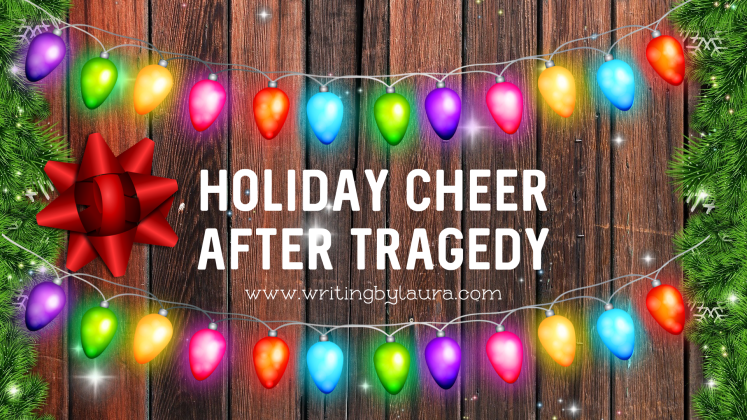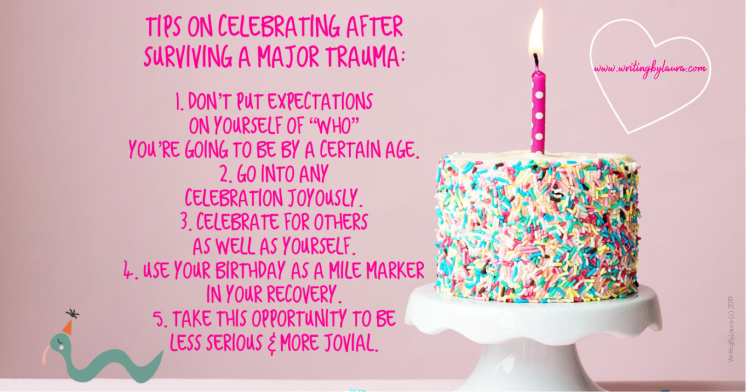It’s that time of year when people are jolly and it’s hard to revel in gloom. Not that I’m depressed and dreary since my accident that left me with a Traumatic Brain Injury (TBI) and very diminished and distorted hearing. I’m really not. I’m perhaps the opposite of dreary since my TBI has greatly altered my perspective and world view (i.e. grateful). What I’m getting at is that the holidays are certainly a time where everything in one’s life is brought into sharper focus. And sometimes that sharper focus can be startling to someone (like me) who has survived a tragedy. For today’s essay I’m going to ruminate further on having good cheer after tragedy.
The topic of this essay perhaps sounds like it’s going to be dire and dreary. I promise you that reading the following blog post won’t make you want to dump all your Christmas decorations in the trash! I promise. To make good on that promise, here’s some artwork I found that I added a “joke” to (see below).
I wrote an essay similar to this before my 40th Birthday this past summer. In that blog post I wrote about how to celebrate happy occasions after experiencing tragedy (specifically birthdays). I broke it down to a list of 5 tips (see below).
My advice for birthdays and celebrations is similar to my advice for holidays. Basically two key principles rule the roost. First, don’t have expectations of what your holidays will be like. Because then you’re just setting yourself up for disappointment. Second, use this time to joyously celebrate. Since you survived trauma you have so much to celebrate and be joyous about. Yes, your world is different and the horrible thing happened but in this moment (and most moments) there’s nothing you can do about it. So why let it spoil the fun? Your traumatic event or tragedy is like a downer person you can’t help but invite to the party. Just like you would do with Debbie Downer (Rachel Dratch’s iconic SNL character) just take the reigns when they/it starts to tell a sad tale or take over with a dour mood.
Part of the reason I think it’s important to celebrate and be joyous is that you aren’t just celebrating for yourself. You’re celebrating for all the friends and family and various people who have helped you in your recovery. I said something similar in my birthday essay. I’m not a proponent of faking emotions or pushing aside feelings (both can be unhealthy habits). That’s not what I am referring to. I’m not even saying “fake it ’til you make it” because I think that can be kind of an unhealthy thought process. What I mean is start to take a step back and realize that those who put forth effort for you are grateful you’re here.
Sometimes the frankness that has taken over my mannerisms causes me to voice when I’m frustrated and unhappy with a person or situation in a way I wouldn’t have before the TBI. I’m afraid that frankness could make people think I’m unhappy. It’s quite the contrary. As my psychologist has mentioned before, people who don’t repress emotions are usually filled with less to no anxiety (and I would posit to say are in less emotional duress). That’s certainly the case for me. I had anxiety before the TBI but after the TBI my brain was rid of those defects.
It’s almost like the Traumatic Brain Injury (TBI) was a rebooting of my brain to “factory settings.” What I mean by that is that neurological issues like chronic migraines and pain and psychological issues like anxiety were disposed of. It’s like when you call tech support and they tell you to unplug (your computer, the DVR, whatever computerized gadget, etc.) and wait a few minutes and then plug 🔌 it back in to reset the computer systems. That solution is always so simple and silly it makes you feel like a dope for not doing it on your own. Well, the severe TBI and resulting 3-week coma was my body’s way of being unplugged (yikes… the metaphor gets dicey right there 😲) and when I came back to consciousness it was like I was a computer being plugged back in (whew… the metaphor got better)!
It was that rebooting that allowed me to jump back into holiday cheer. It’s a different mindset being a chronic pain sufferer with no hope for relief in sight to being someone striving to recover and heal from injury. All of a sudden my determination wasn’t dismantled by a malfunctioning body in endless pain. Don’t get me wrong, I still have pain. And my hearing distortions and limitations break my heart. But I have plenty that makes me smile. And smiling and laughing were things that I had to learn how to do again after my brain injury. Resetting to “factory settings” meant I had to relearn a lot of things that I took for granted before but to me that makes things a little more hard won and sweeter.
I will say that my holiday cheer has come in the form of baking (I have several Pinterest boards dedicated to “Sweet Treats”) and crafting. I’ve become Suzy Homemaker for some reason (and I don’t think my parents mind). I have also become quite resourceful when it comes to gift ideas. All of these things result in me bringing holiday cheer when a few years ago that didn’t seem possible. And on days when I’m sad I can’t hear the annoying (I assume) Christmas song that plays on one of Selby’s toys I just make Selby wear one of her cute sweaters and enjoy the parts of the holidays I can enjoy.
Here’s proof of some of my holiday crafts:

Writing Update
I haven’t written more. Don’t worry. I haven’t given up. This Christmas elf just got busy with making Christmas cheer!



Laura, you have an amazing attitude and perspective. You’re an example of post-traumatic growth! Have a wonderful Christmas!
LikeLiked by 1 person
Thanks Karen! What a nice thing to say. 😁 Merry Christmas to you too!
LikeLike
Someone should sell a brain reboot procedure. I think a lot of us would benefit. Maybe some of these maladies like depression or neurological disorders would go away. My TBI accompanied a life threatening accident where I teetered on the edge of death for a few days and then required a year of recovery. Two years after my accident, my wife and I watched It’s a Wonderful Life. Once the movie hit George’s existential crisis, we both started crying and we blubbered nonstop until the movie ended. The holidays can be an emotional time. We have so much wrapped up in it from childhood/family memories. Sometimes you can’t really tell what you’re feeling until it’s too late. 🙂
LikeLiked by 1 person
Yes, if only they could figure out a brain rebooting without the traumatic event to accompany it.
LikeLiked by 1 person